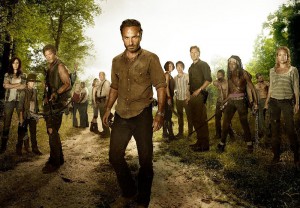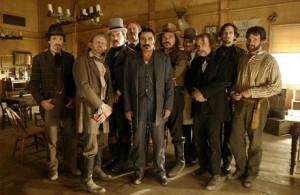The Walking Deadwood? The Western and the Post-Apocalyptic Tale
 As The Walking Dead returned this past week for its mid-season premiere, it seemed an appropriate time to write this short post about genre. This piece argues that The Walking Dead presents an interesting blend of genres, particularly as an intersection of the post-apocalyptic tale and the western. These ideas are the beginnings of a work in progress, part of an article that I’m currently writing. Comments and/or suggestions are welcome.
As The Walking Dead returned this past week for its mid-season premiere, it seemed an appropriate time to write this short post about genre. This piece argues that The Walking Dead presents an interesting blend of genres, particularly as an intersection of the post-apocalyptic tale and the western. These ideas are the beginnings of a work in progress, part of an article that I’m currently writing. Comments and/or suggestions are welcome.
Over the last several decades a number of books, television programs, and films have created narrative universes set in post-apocalyptic times. Writers such as Mark Harris suggest that these types of narratives have grown increasingly popular out of, as he puts it, “the fear of a total systemic collapse.” These fears seem reasonable to anyone who keeps apace with current events, the near constant reminders over the growing global scarcity of clean water and food, and the dire predictions related to global climate change. These tales also seem rooted in a fascination with viewing society in its crumbled aftermath, the dissolving civility among survivors, and the lawlessness brought about by the daily challenge to stay alive, as played out in books such as The Stand, and The Night of the Living Dead films, and the television program The Walking Dead. If we think of apocalypse tales such as these as representative of a genre, perhaps as a subset of horror or science fiction, then the descriptions above create a basis for contemplating the nature of these stories, their visual and auditory styles, character tropes, and their ideological underpinnings.
In many ways, however, the apocalyptic genre seems to have significant roots in the western, another vastly popular genre in the United States. From the other side, the western encompasses many of the same thematic elements as the modern apocalypse tale: the untamed frontier, man coming to terms with the lawlessness of survival, the unrelenting harshness of nature, the desire for good to triumph over evil, and the necessity of avoiding disease, infection, and accidents in a pre-modern world. There are both ideological and stylistic connections between these two genres, at least across two recent television programs: HBO’s Deadwood (2004-2006) and The Walking Dead (2010- ), currently a record-breaking cable program in the middle of its fifth season on AMC. Both Deadwood and The Walking Dead use similar generic storytelling elements to create seemingly unbelievable worlds, one in the distant past and one in a horrific future, told partially through the tale of the reluctant lawman: Seth Bullock (Timothy Olyphant) and Rick Grimes (Andrew Lincoln).
 While many long-running American television westerns such as Bonanza (1959-1973) and Gunsmoke (1955-1975) predate Deadwood, the sustained serialized narrative of Deadwood, along with the unencumbered storytelling possibilities of HBO, allowed the show to feature gritty and grotesque images of the day-to-day existence of the town’s residents. Deadwood‘s insistence on focusing on the perhaps more historically “realistic” images of endless dirt, dust, and mud, the unsavory employment options for poor women, and unwashed and unruly townspeople, perhaps gave new life to the genre and prompted a resurgence in interest in these types of tales. Likewise, the sustained, multi-season run of The Walking Dead (and its future spin-off) has created new possibilities for exploring the post-apocalyptic narrative, continually focusing on these same visual and stylistic elements to define these pre- and post-modern worlds.
While many long-running American television westerns such as Bonanza (1959-1973) and Gunsmoke (1955-1975) predate Deadwood, the sustained serialized narrative of Deadwood, along with the unencumbered storytelling possibilities of HBO, allowed the show to feature gritty and grotesque images of the day-to-day existence of the town’s residents. Deadwood‘s insistence on focusing on the perhaps more historically “realistic” images of endless dirt, dust, and mud, the unsavory employment options for poor women, and unwashed and unruly townspeople, perhaps gave new life to the genre and prompted a resurgence in interest in these types of tales. Likewise, the sustained, multi-season run of The Walking Dead (and its future spin-off) has created new possibilities for exploring the post-apocalyptic narrative, continually focusing on these same visual and stylistic elements to define these pre- and post-modern worlds.
The most interesting intersection of these genres is the uncomfortable relationship each narrative has with technology, even when it is not specifically acknowledged. For example, built into Deadwood are instances of a burgeoning western settlement in the midst of a new social order, such as when Al Swearengen (Ian McShane) looks unhappily upon the landscape as workers install telegraph lines connecting Deadwood to the outside world. In that moment, Swearengen foresees a loss of power through this technological encroachment. On The Walking Dead, on the other hand, one of the discomforts right under the surface is the disconnect from the comforts of modern life, and the need to learn or relearn how to hunt, farm, forage, and survive with minimal modern equipment (guns, cars, bullets, etc.). At the same time, this relationship with technology is similarly loaded, particularly in the moments in which The Walking Dead‘s characters acknowledge the man-made triumphs of modern technology as the possible cause for the plague of the walking un-dead and the inability to utilize the same technologies to prevent the collapse of American society or to restore its former social order.
Can The Walking Dead be read as an unconscious desire to return to the frontier, or a cautionary warning about the destructive path of the modern world? What seems to be the clear divide between these two narratives is split between the overarching ideological subtext. Though it can be interpreted in several ways that shift over the course of the series, the characters on The Walking Dead are only able to continue their battle in their zombie apocalypse world through a continued return to the idea of hope and faith in the future. This is true as well for characters in westerns—after all, the westward expansion in the US speaks to seeking out new worlds to improve chances for a better life. This thematic thread works in westerns. After all, they are loosely based in historical fact. Viewers know the fate of these characters (and sometimes real world figures) so the tension of the survival of humanity on the frontier is moot. But in the case of The Walking Dead, the opposite is true. Each and every episode brings more turmoil, more unrest and more uncertainty to the lives of the survivors. In a world that makes no promises about humanity (or civilization) even having a future, the characters force themselves, beyond all reason, to remain hopeful for better days.


